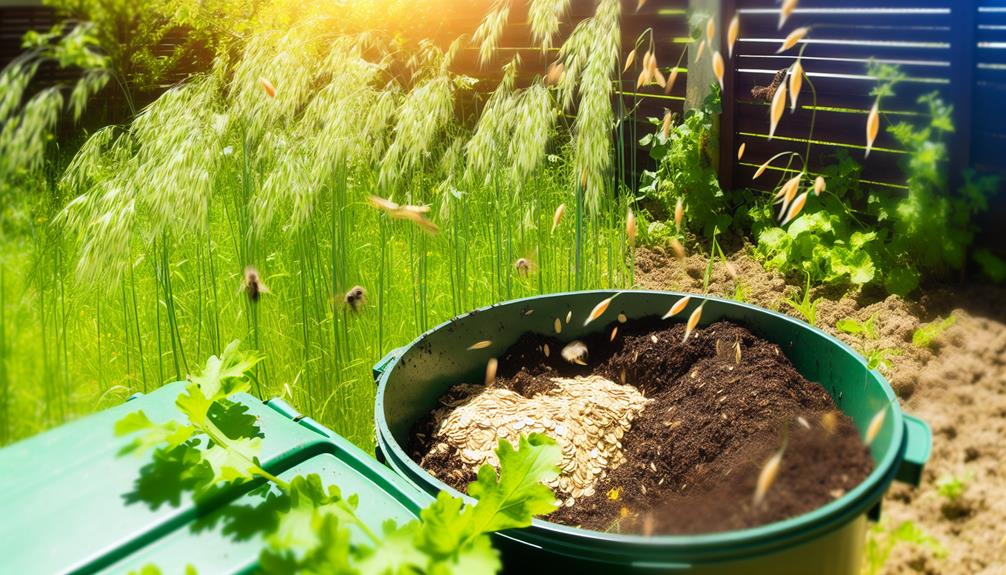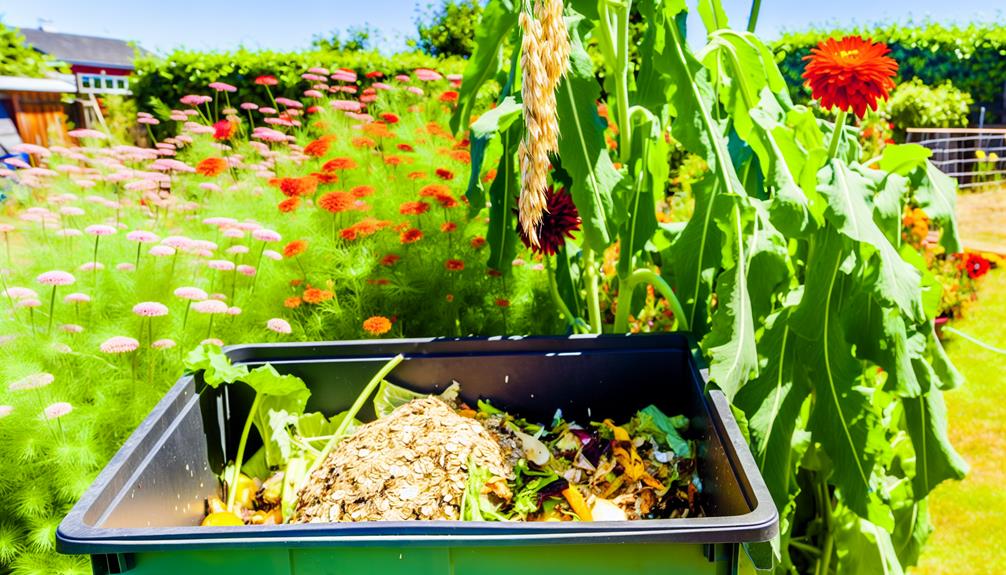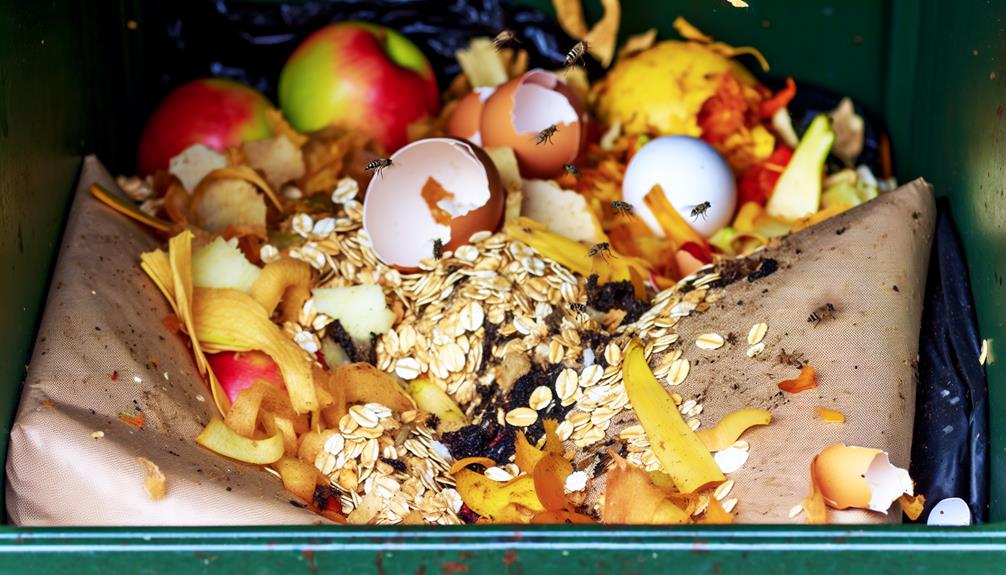

You can compost uncooked oats to add valuable nutrients to your compost pile. These oats enhance soil texture, boost microbial activity, and support plant growth. However, be cautious of potential drawbacks like moisture retention, pest attraction, and mold growth. To avoid issues, layer oats with nitrogen-rich materials, maintain a balanced compost structure, and regularly turn the pile.
Proper moisture monitoring is also vital. Oats contribute both nitrogen and carbon, accelerating decomposition and balancing the compost. Just remember, adding too many can attract pests and cause uneven breakdown. Implement these tips to effectively compost oats and improve your garden’s health.
Composting uncooked oats often enhances your soil with essential nutrients and improves its texture. By adding oats to your compost pile, you’re introducing a source of organic matter that breaks down and integrates with the soil. This process helps create a nutrient-rich environment, supporting plant growth and soil health.
To get started, simply mix uncooked oats into your compost. They decompose relatively quickly, contributing to the overall organic matter. This boosts the microbial activity in your compost, leading to better soil enrichment. These microbes are key players in breaking down the oats, releasing nutrients like nitrogen and potassium into the soil. This nutrient boost makes your plants healthier and more robust.
Remember to balance your compost by adding browns and greens. Oats fall into the ‘greens’ category, so pair them with items like dried leaves or cardboard (browns) to maintain an ideal compost mix. The combination of these materials ensures proper aeration and moisture levels, speeding up the composting process.
Also Read: Can You Compost Bones?
While incorporating uncooked oats into your compost has its benefits, you should be aware of some potential drawbacks. Being well-informed helps you manage your compost effectively and avoid any unwanted issues.
First, uncooked oats can lead to excessive moisture retention. When oats break down, they absorb a lot of water, potentially creating a soggy compost pile. This excess moisture can disrupt the balance needed for proper decomposition and slow down the composting process.
Second, there’s the issue of pest attraction. Uncooked oats can attract pests like rodents and insects that are drawn to the grains. If your compost pile becomes a food source for these pests, it could lead to infestations and other problems.
Finally, consider the risk of mold growth. The moisture retention properties of oats can create a damp environment conducive to mold. Mold not only affects the quality of your compost but can also pose health risks.
Here’s a quick summary of potential drawbacks:
To maximize the benefits and minimize the drawbacks of adding uncooked oats to your compost, always follow these best practices.

First, focus on maintaining a balanced compost structure. Uncooked oats are rich in carbon, so you’ll need to balance them with nitrogen-rich materials like vegetable scraps or grass clippings. This combination helps keep your compost active and decomposing efficiently.
Layering techniques are essential when incorporating uncooked oats. Layer the oats between other compost materials to avoid clumping, which can hinder decomposition. Start with a base layer of coarse materials like twigs or straw to promote aeration. Then, alternate layers of uncooked oats with nitrogen-rich greens and other brown materials. This method ensures an even distribution of materials and promotes faster composting.
Regularly turning your compost is vital. Turning helps to mix the oats evenly and introduces oxygen, which speeds up the decomposition process.
Monitor moisture levels, aiming for a consistency similar to a damp sponge. Too much moisture can lead to a soggy pile, while too little can slow down decomposition.
Also Read: Can You Compost Body Wash?
Understanding the nutrient contributions of uncooked oats can help you optimize the quality of your compost. When you add uncooked oats to your compost, you’re introducing a variety of nutrients that boost soil enrichment. These oats break down relatively quickly, making them an essential addition to your compost pile.
Here are three key nutrient contributions uncooked oats provide to your compost:
Also Read: Can You Compost Blood?
Many people make mistakes when adding uncooked oats to their compost, which can hinder the composting process. One common error is failing to balance the oats with enough brown materials like leaves or paper. This imbalance can lead to poor decomposition. To prevent contamination, avoid adding large quantities of oats at once, as they can attract pests and rodents.

Another frequent mistake is neglecting proper moisture management. Uncooked oats can absorb moisture, making the compost too wet and causing it to become anaerobic. Turn the pile regularly to guarantee even moisture distribution and aeration.
Here’s a quick table to summarize these common mistakes and their solutions:
| Mistake | Consequence | Solution |
|---|---|---|
| Adding too many oats | Attracts pests and rodents | Balance with brown materials |
| Poor moisture management | Compost becomes anaerobic | Turn the pile regularly |
| Not mixing thoroughly | Uneven decomposition | Mix oats well with other compostables |
Yes, uncooked oats can attract pests to your compost bin. To guarantee this, use pest deterrents and make sure your compost bin location is well-chosen. You’ll create a more welcoming and effective composting environment for everyone.
Uncooked oats break down slower than cooked oats due to their higher decomposition rate. However, both add valuable nutrient content to your compost. Including them helps create a rich, welcoming environment for all composting enthusiasts.
No, you shouldn’t rinse uncooked oats before adding them to compost. Rinsing won’t impact their nutrient contribution and could increase mold growth. Just add them directly, and they’ll break down naturally, enriching your compost.
You can mix uncooked oats with other compost materials directly. Make sure you maintain nutrient balance by adding greens and browns, and keep an eye on moisture control to foster a healthy composting community.
You might notice odors if moisture levels are too high, creating anaerobic conditions. To prevent this, balance your compost mix and maintain good aeration. You’re part of a community that values sustainable living, so keep your compost healthy!
Composting uncooked oats can boost your compost’s nutrient profile. You should take precautions to avoid common pitfalls. Mix oats with other compost materials to balance moisture and carbon ratios.
Avoid adding large quantities at once to prevent clumping and mold growth. By following these best practices, you’ll efficiently recycle kitchen waste and enrich your garden soil. This makes your composting efforts more effective and sustainable.
